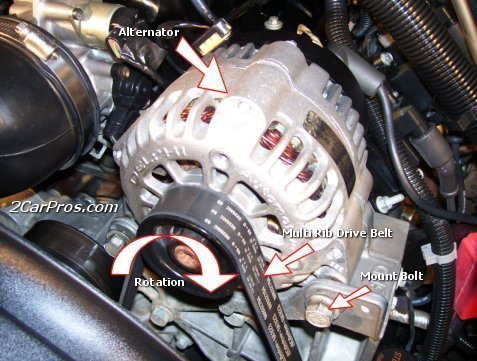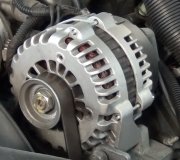Can't argue about the proximity of the wiring to the thermostat housing, but I've never disconnected the battery to do that job just because we run into so much trouble by doing so on many newer vehicles. We joke in the shop too about the service manual listing that step. "Disconnect the battery before replacing the wiper blades". "Disconnect the battery before emptying the ash tray". I know that sounds sarcastic but the reason for doing that is liability. If anything happens, the manufacturer can say "you didn't follow procedure". A common sense approach is to unbolt the alternator fuse in the under-hood fuse box. That will remove the short potential at the alternator's output terminal without risking locking up any computers. I removed the alternator from my minivan a few weeks ago to replace the brush assembly, and I didn't disconnect the battery. Obviously I'm not suggesting anyone else be that lazy but in my case I avoided the possibility of cracking the decrepit lead terminal on a 23-year-old vehicle.
To add to the insult, I rarely disconnect the battery when removing an air bag, and I'll guarantee you every service manual has big bold letters stating that requirement. Again, it's for liability. We've had so many warnings but now that I understand how the systems work and all of the safeguards that are built in, I know why we don't read about mechanics being injured from accidentally deploying an air bag. The few that do deploy accidentally are usually the result of careless handling and they are already disconnected from the car's electrical system, so what good did that "disconnect the battery" step do? Here again, for the other people reading this, please do as I say, not as I do, and disconnect the battery. I'm only pointing out that this step is listed for a reason so it should be performed.
Many mechanics do not have a good understanding of electronics because they can't see or touch it. Those people are naturally going to replace the alternator as a first attempt because everyone knows the voltage regulator circuit is extremely trouble-free. I can't think of anything I could do to intentionally damage one other than hitting it with 120 volts house current. You may indeed have found an inexperienced / sloppy / incompetent / distracted / careless mechanic but you have to at least keep an open mind that it's possible he didn't cause the charging problem. Problems occur all the time. It's a matter of where the truck is when that happens. I've been blamed for dead horns that didn't work so no one would open the shop door for me. How the owner could think I caused the problem by pressing the horn button is beyond me. A woman blamed me for a noisy wheel bearing, ... Three weeks after I replaced her wiper motor. A lot of mechanics have been blamed for multiple problems on anti-lock brake systems because some computers can only set one diagnostic fault code at a time. A second or third problem won't be discovered until the first one is repaired. Really hard to give an accurate estimate on those cars.
As for your oil cap, that is sloppy work but it's real easy to understand, especially if two or more people were involved in the repairs. Who would expect to find a new oil cap on a ten-year-old truck unless they took it off them self? If I were asked to help on a job already in progress, I would likely assume a new cap was for some other vehicle, especially if the guy next to me was working on a newer one. Most mechanics leave the oil cap on the engine when it's removed but some put them on their work bench so they'll see it if they forget to put it back on. Your cap likely ended up on the bench with the valve cover that was being cleaned up. Again, a wrong oil cap is not a sign of a professional, but it's hardly worth holding the entire shop in contempt.
There's always two sides to every story. I spent a lot of time in the classroom preparing my students in ways to prevent things like this from happening. Even the best-intentioned mechanics make mistakes but isn't it funny we hold them to a much higher standard than doctors? Doctors just bury their mistakes, or we run from one to the next until we find a diagnosis we like. Boy, let a mechanic do something wrong to our transportation and they don't deserve an ounce of forgiveness, or even the benefit of the doubt. Of course you are going to hold your mechanic responsible for everything that happens to your truck from now on. It's human nature to want to blame someone else.
Working on cars and tvs for so long, I've seen a lot of things break down right in front of me so now whenever I get less than satisfactory service from anyone, my first thought is how could this have happened without it being the fault of that waitress, cashier, carpenter, mechanic, etc. I don't blame the person until every other possibility has been examined, and then I know it doesn't do any good to get angry. No one is going to go out of their way to help someone who is yelling, won't listen to reason, or is just looking for someone to blame.
I can't fault you for being unhappy, but from the tone of your posts, it sounds like you won't even entertain the notion that the mechanic did not cause the charging problem. It sounds like you aren't sure and you want us to verify that he is to blame. I would certainly suspect he DID do something since he was in that area, but given the really low failure rate of older Chrysler Engine Computers, especially the voltage regulator circuitry, I'd be looking in other parts of the circuit first. There could have even been a little surface corrosion on a connector pin at the computer or in the plug in the middle of the wiring harness. The simple scratching action of disconnecting the plug and reconnecting it will scrape a clean spot that makes a good connection again, ... For a little while. We saw that all the time with tvs. Pull out a plug-in module to visually inspect it, find nothing wrong, plug it back in and the tv works fine! That was so common that I built similar defects into the cars my students used for practicing their troubleshooting skills. Who is to say there wasn't a little corrosion on your computer plug, and by wiggling it during the valve cover service, it aggravated it enough to cause a bad connection? That would APPEAR to be solved by installing a new computer, but the real proof would be to stick the old computer back in and see if the problem was still there. You haven't even considered that possibility but in my electronics experience, that is a more likely scenario than a defective computer. As further proof, we used to send tv modules in to the manufacturer for repair and they would sometimes come back labeled "no problem found". A different module got the tv working, and that old module worked fine in a different tv. That didn't happen all the time but it happened enough that it wasn't worth discussing in the shop.
You said you want to prove your mechanic damaged something. To do that you're going to have to figure out exactly what happened, otherwise "coincidence" is an unlikely but very real possibility. MY alternator was working fine up to the point I parked in my friend's driveway. It was dead as soon as I restarted the engine and left an hour later. Can I blame the worn brushes on him not fixing my laptop properly?
I physically took Engine Computers apart on a '95 Intrepid, '97 Dakota, and three Shadows to purposely cut some internal connection to create a voltage regulator defect that could be switched in and out for my kids to diagnose. I've seen them accidentally short that voltage regulator wire to ground and apply 12 volts directly. THAT'S how I know you can't kill those circuits. That probably doesn't make you feel any better, but it's why I'm not 100 percent convinced your mechanic caused the problem. The timing is suspicious but you have to at least leave open the possibility of an unfortunate coincidence. You might be right, but if you are going to insist he caused the damage, I'm going to insist, "not necessarily".
Monday, December 5th, 2011 AT 12:34 AM




